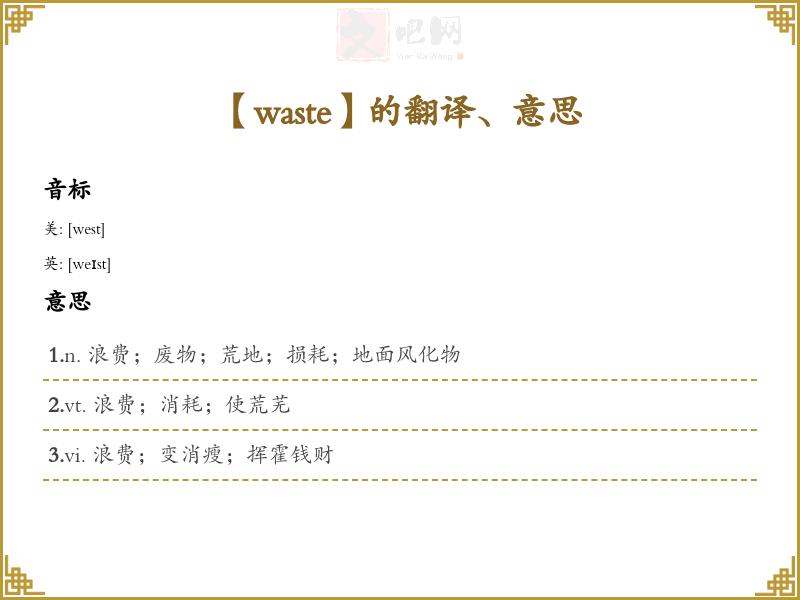【waste】的翻译、意思
时间: 2025-04-26 18:21:11
【waste】怎么读
美:[west]
英:[weɪst]
【waste】是什么意思、字义解释
1. n. 浪费;废物;荒地;损耗;地面风化物
2. vt. 浪费;消耗;使荒芜
3. vi. 浪费;变消瘦;挥霍钱财
4. adj. 废弃的;多余的;荒芜的
【waste】的详细解释
英文单词学*与分析:[waste]
1. 基本定义
- 字面意思:
“Waste” 意为浪费、废物或损失,指的是未被有效利用的资源或物品。 - 词性:
- 名词 (noun): 指废物或浪费的东西。
- 动词 (verb): 指浪费某物的行为。
- 形容词 (adjective): 描述某物是浪费的或无用的。
2. 词源与起源
-
词源分析:
“Waste” 源自古法语“waste”,进一步源自拉丁语“vastare”,意为“摧毁”或“荒废”。词根“vast”意为“空的”或“无用的”。 -
历史背景:
“Waste” 在英语中的首次使用可以追溯到13世纪,最早用于描述资源的损失或未被利用的状态。 -
课本:
在**,尤其是中学英语教材中,常常会出现“waste”作为重要词汇。
在牛津大学出版社和美国的教材中,通常在初中阶段教授该词,涉及到环境保护、资源利用等主题。
3. 使用场景
-
正式与非正式语境:
- 正式:在环境科学或政策文件中,常提到 “waste management”(废物管理)。例如,“Effective waste management is crucial for sustainable development.”
- 非正式:在日常对话中,可能会说,“Don’t waste your time on that movie; it’s not worth it.”(别在那部电影上浪费时间;不值得。)
-
特殊场合:
- 法律:在法律文件中,“waste” 可以指对财产的不当使用。例如,“The tenant is liable for waste to the property.”(租户对该财产的损害负有责任。)
- 科学:在生物学中,可能会提到“waste products”(废物),如“Carbon dioxide is a waste product of respiration.”(二氧化碳是呼吸的废物。)
4. 示例句子
-
Waste not, want not.
“不浪费,就不会缺乏。” — 这是一句谚语,鼓励节约。 -
The company aims to reduce waste in its production process.
“该公司旨在减少生产过程中的浪费。”
— 商业环境中常见的表述。 -
Food waste is a significant issue in many countries.
“食品浪费在许多国家是一个重大问题。”
— 环境保护的重要讨论话题。 -
He felt it was a waste of money to buy such an expensive car.
“他觉得买这么贵的车是一种浪费。”
— 日常交流中的观点表达。 -
The city has implemented new policies to manage waste effectively.
“该市实施了新政策以有效管理废物。”
— 政策与环境管理的结合。
5. 同义词与反义词
-
同义词:
- Squander:通常指时间或金钱的浪费,侧重于不必要的消耗。
- Misuse:指错误使用某物,可能导致浪费。
-
反义词:
- Conserve:指保护和节约资源,强调有效利用。
- Utilize:指充分利用某物,强调有效使用。
. 学方法
- 音标记忆法:
通过音标/weɪst/记住发音,结合与“waste”相关的词,如“wasteful”(浪费的)来加深记忆。
7. 关联词汇
- Waste management:废物管理
- Waste reduction:减少浪费
- Waste disposal:废物处理
- Hazardous waste:危险废物
- Organic waste:有机废物
通过以上分析,用户可以更全面地理解和应用“waste”这个单词。
【waste】例句
1、[V-T] If you waste something such as time, money, or energy, you use too much of it doing something that is not important or necessary, or is unlikely to succeed. 浪费
-
例:There could be many reasons and he was not going to waste time speculating on them.原因可能很多,而他不打算浪费时间猜测这些原因。
-
例:I resolved not to waste money on a hotel.我决定不把钱白白浪费在旅馆住宿上。
2、[N-SING] Waste is also a noun. (时间、金钱等的) 浪费
-
例:It is a waste of time going to the doctor with most mild complaints.为了种种小毛病去看医生是浪费时间。
3、[N-UNCOUNT] Waste is the use of money or other resources on things that do not need it. 浪费
-
例:The packets are measured to reduce waste.测量包裹尺寸以减少浪费。
4、[[also N in pl]] Waste is material that has been used and is no longer wanted, for example, because the valuable or useful part of it has been taken out. 废物; 废水
-
例:Congress passed a law that regulates the disposal of waste.国会通过了一条管理废物处理的法律。
-
例:...the dangers posed by toxic waste.…有毒废弃物造成的危险。
5、[V-T] If you waste an opportunity for something, you do not take advantage of it when it is available. 错过 (机会)
-
例:Let's not waste an opportunity to see the children.我们别错过看看孩子们的机会。
6、[PHRASE] If something goes to waste, it remains unused or has to be thrown away. 被浪费掉
-
例:So much of his enormous effort and talent will go to waste if we are forced to drop one hour of the film.如果我们被迫删减一小时的电影,就会浪费掉他的非凡努力和才华。
